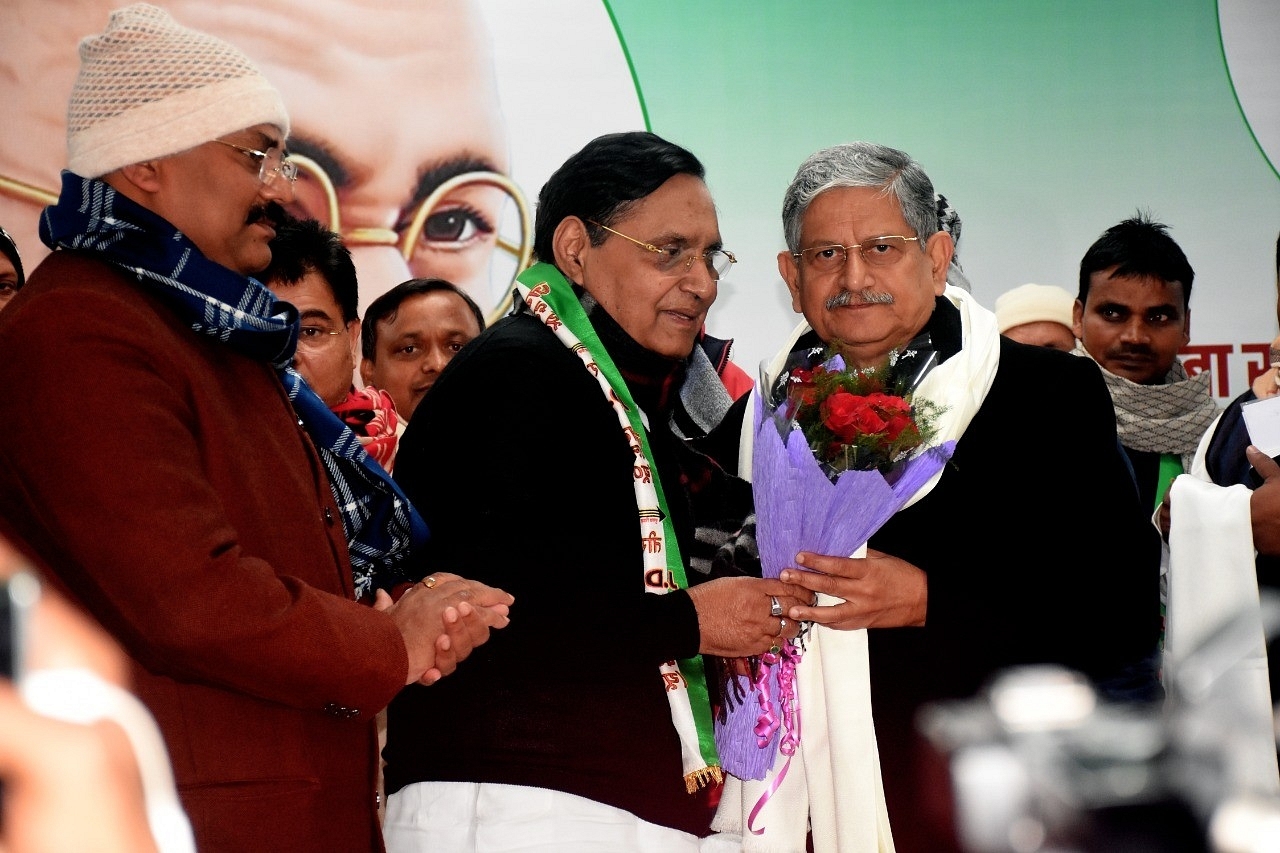News Brief
Suspended Bihar BJP Leader Returns To JD(U), But Move May Not Have Any Impact On State Politics Or BJP
- Rajiv Ranjan started gravitating towards the JD(U), soon after Nitish Kumar broke the alliance with the BJP and returned to the Rashtriya Janata Dal (RJD)-led mahagathbandhan in August last year.

Former BJP leader Rajiv Ranjan (centre) joining JD(U)
Former vice-president of Bharatiya Janata Party's Bihar unit, Rajiv Ranjan, who was suspended from the saffron party in end-December, joined the Janata Dal (United) on Sunday (15 January).
Rajiv Ranjan, who had quit the JD(U) to join the BJP in 2015, was suspended by BJP state unit president Sanjay Jaiswal on 30 December 2022, for six years for ‘anti party activities’.
The suspended BJP functionary was welcomed back to his former party by JD(U) national president Rajiv Ranjan alias Lalan Singh and JD(U) state president Umesh Singh Kushwaha. The suspended leader joined the JD(U) along with 800 supporters approximately, from Nalanda district. In 2010, he was elected as a MLA from Islampur constituency of that district on a JD(U) ticket.
However, he quit the JD(U) in 2015 after severely criticising Chief Minister Ntish Kumar. He had then claimed that Kumar’s faulty policies had failed to lift Bihar out of poverty and backwardness.
The BJP rewarded him with the vice-president’s post and made him the media-in-charge of the saffron party. However, Rajiv Ranjan started gravitating towards the JD(U), soon after Nitish Kumar broke the alliance with the BJP and returned to the Rashtriya Janata Dal (RJD)-led mahagathbandhan in August last year.
Rajiv Ranjan started issuing statements in favour of Nitish Kumar since then. Matters came to a head when he openly supported Nitish Kumar’s prohibition policy, which the BJP outright opposed.
The former Islampur MLA also publicly opposed the BJP’s demand for compensation to the victims of the hooch tragedy in Saran which claimed more than 70 lives. The victims had consumed illicit liquor (also known as ‘hooch’).
The BJP contended that Kumar’s prohibition policy had forced the poor to consume illicitly-brewed liquor that is often poisonous. Consumption of hooch has led to hundreds of deaths in Bihar since prohibition came into effect in 2016.
BJP’s demand for compensation to the families of those who died and to those who fell ill after the consumption of hooch was vehemently opposed by the JD(U) and Kumar himself. Kumar got into an ugly spat with BJP leaders inside the state assembly over this.
Rajiv Ranjan blatantly opposed the demand for compensation and supported the prohibition policy, leaving the BJP deeply embarrassed. State party chief Sanjay Jaiswal wrote to Rajiv Ranjan: “Your utterances have been unbecoming of a state vice president and also adversely affect the party's reputation. You are hereby relieved of your post and suspended from the party for six years”.
Almost simultaneously, Rajiv Ranjan also announced his resignation from the BJP and started hobnobbing with JD(U) leaders.
Ranjan’s return to the JD(U) is, thus, not surprising. In fact, it was only expected. And the BJP is not bothered about its former state vice-president returning to the JD(U).
“This was expected and it will not affect the political situation in Bihar at all. Rajiv Ranjan is not a political heavyweight and does not have much influence even in Islampur from where he was elected once. We gave him a lot of respect, but he backstabbed us. His departure from our party will have zero effect on the BJP. And the JD(U) will also gain little by his return to that party,” BJP state president Jaiswal told Swarajya.
Political analysts agree with Jaiswal. “Rajiv Ranjan is not an important politician at all and his departure from the BJP or joining the JD(U) is of little significance. The BJP will not lose anything and the JD(U) will also not gain anything with Rajiv Ranjan’s exit from or entry into those parties,” said Trilochan Singh, a former professor of political science at Patna University.
Introducing ElectionsHQ + 50 Ground Reports Project
The 2024 elections might seem easy to guess, but there are some important questions that shouldn't be missed.
Do freebies still sway voters? Do people prioritise infrastructure when voting? How will Punjab vote?
The answers to these questions provide great insights into where we, as a country, are headed in the years to come.
Swarajya is starting a project with an aim to do 50 solid ground stories and a smart commentary service on WhatsApp, a one-of-a-kind. We'd love your support during this election season.
Click below to contribute.
Latest